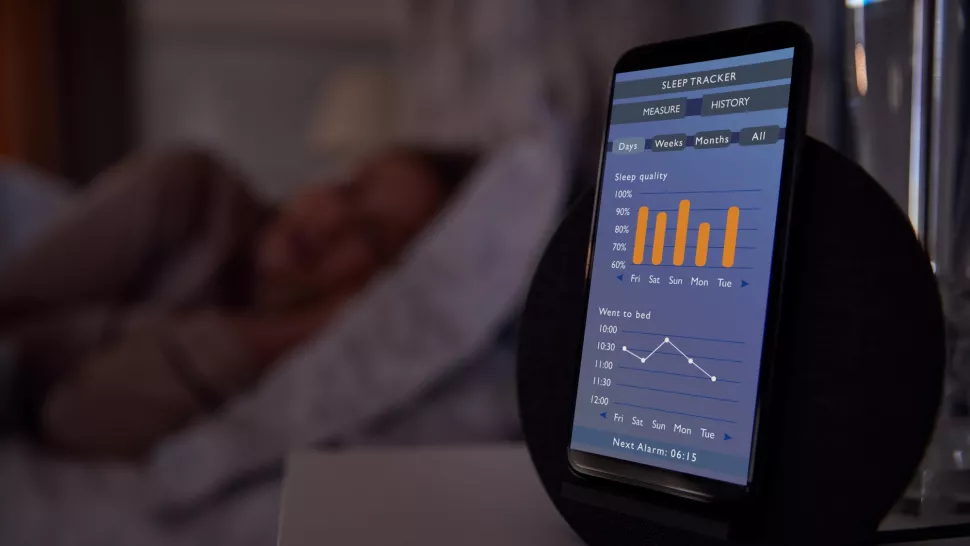
By collecting information about how and when you sleep, you can turn that information into guidelines for minimizing your tossing and turning.
But sleep apps don’t just log data. Some offer soothing sounds and music to help you fall asleep. Others are part of various qualities of meditation and spiritual well-being. And some even promise to help you wake up at the ideal time every morning.
It’s easy to see why the best sleep apps are so appealing. Most of us need 8 hours of sleep, and most of us don’t even come close. So any app that can help us detect why we’re not sleeping is a step in the right direction.
Best Sleep Apps for Android and iOS
1. Sleep Cycle:
Sleep Cycle uses a scientific approach to wake you up after a good night’s sleep. Using your smartphone’s accelerometer and other sensors to record your sleep habits, the free app uses sleep cycle theory to wake you up at just the right time so you can rest optimally.
Users set a time window (for example, a 30-minute stretch) instead of the traditional exact wake-up time, and when the app judges that the sleep movement is good, it triggers an alarm. In addition to a smart alarm, Sleep Cycle records your sleeping habits to track your sleep quality over time.
The free version of Sleep Cycle collects sleep statistics, provides sleep analytics, and integrates with Apple Health (for iPhone users at least). For $29.99 a year, you get the premium version of Sleep Cycle, which includes a customizable alarm window, sleep aids like stories and sounds, more comprehensive sleep trends and benchmarks, and even weather data so you can track your time. conditions affect your sleep.
2. Sleep Score:
Sleep Score takes a different approach to recording sleep quality than some of the other sleep apps we’ve included here. Skip the use of portable devices or the need to lay the phone on the mattress to record your movements, instead use the phone’s microphone and speakers, such as a sonar station, to record your movements as you sleeps. This helps the app generate a sleep score and record many other metrics that indicate sleep quality.
Through Sleep Score, you can also get tips to prepare for better sleep, as well as a smart alarm clock and sleep sounds that can help you fall asleep. Premium subscribers have access to long-term data logging and deeper analysis, as well as a sleep report that you can share with your doctor.
Note: On Android, the sleep probe feature is only certified for some phones, such as the latest Samsung Galaxy, Note and Google Pixel models.
3. Headroom:
Headspace is more than one of the best relaxation apps for mindfulness and guided meditation. The app also has a section dedicated to sleep aids with “Sleep cast” relaxing guided meditations, relaxing exercises designed to prepare your mind for rest, and soothing music to help you rest at night. That’s all in addition to Headspace’s rich library of free and premium guided meditations.
Free Headspace users get a limited library of guided meditations and dream casts, and premium subscribers who pay $12.99 per month get access to the full library of over 40 different shorter courses and meditations.
4. Calm down:
Calm is another relaxation app that finds a place on our list of the best sleep apps. This guided meditation and mindfulness download contains a variety of programs to reduce stress, anxiety and help you sleep better.
The meditations are of varying duration, 3-25 minutes. In addition to daily meditations and breathing exercises, Calm contains over 100 bedtime stories, basically bedtime stories told by Stephen Fry, Matthew McConaughey and others that will put you at ease. With these features, a monthly subscription will cost you $14.99.
5. A pillow:
The pillow focuses on the sensors on your iPhone or Apple Watch and monitors the duration and quality of your sleep. Based on the collected data, Pillow can provide breakdowns with different sleep stages, such as REM and deep sleep, as well as heart rate tracking and sleep quality assessment. As an iOS app, it naturally integrates with Apple’s built-in Health app.









